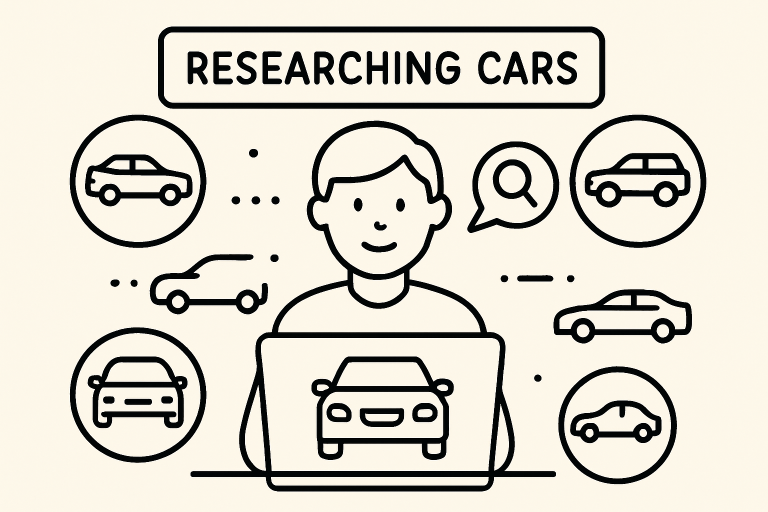New Car Buying: Research, Test Drive, and Negotiation Tips
Contents
Key Takeaways
- Thorough research and preparation are essential for a successful car purchase.
- Timing your purchase can lead to significant savings.
- Exploring various financing options ensures you secure the best terms.
- Effective negotiation and understanding the total cost of ownership are crucial.
Table of Contents
- Define Your Needs and Budget
- Conduct Thorough Research
- Time Your Purchase Strategically
- Explore Financing Options
- Schedule and Conduct Test Drives
- Negotiate the Best Deal
- Review the Fine Print
- Consider the Total Cost of Ownership
- External Resources
Define Your Needs and Budget
The first step to buying a new car is to examine your everyday requirements and lifestyle needs closely. Consider your commute, typical passenger numbers, storage requirements, and preferences for technology or safety features. By understanding what you truly need from a vehicle, you can avoid overspending on unnecessary upgrades or models that don’t fit your daily life.
Budgeting is more than just looking at the sticker price—factor in long-term expenses such as insurance premiums, routine maintenance, and fuel costs. Assess your financial situation and determine a price range that won’t stretch you too thin. Walking into a dealership with a clear budget empowers you to shop confidently and resist upselling pressure. To learn more about new car options, available financing, and insightful car-buying tips, consult trusted local dealerships for the latest guidance.
Conduct Thorough Research
Once your needs are defined, it’s time to identify which makes and models meet your criteria. Use automotive comparison websites, manufacturer pages, and trusted online reviews to gauge reliability, safety ratings, and owner satisfaction. Look for patterns in feedback—repeated mechanical issues or consistently glowing reviews can inform your final decisions.
Check multiple sources for price comparisons and explore any available dealer or manufacturer incentives. Consider upcoming model releases that may lead to additional discounts on current-year models. Resources like Consumer Reports’ Guide to Getting a Great Deal on Your Next New Car offer unbiased, in-depth advice to maximize your buying confidence.
Time Your Purchase Strategically
When you buy, it can be just as influential as what you buy. Dealerships often offer the best incentives at the end of the month, quarter, or calendar year, when sales teams are motivated to meet quotas. Major holiday sales events also present opportunities for additional discounts or promotions, allowing buyers to save thousands over the life of their loan.
Pay attention to dealership inventory cycles; shopping when lots are full gives you a broader selection, while year-end clearances mean extra negotiating leverage on outgoing models. Timing your purchase carefully ensures you find the right car at a price that fits your budget.

Explore Financing Options
Before stepping into a showroom, consider securing pre-approval from your bank or a credit union. Pre-approval establishes a baseline for interest rates and loan terms, making it easier to spot a great deal or identify unrealistic offers. Compare various financing choices, including direct lending, dealer-arranged financing, and manufacturer incentives.
Review the terms of each offer closely. A seemingly minor difference in interest rates can add to significant savings or expenses over the loan’s lifetime. Financial comparison tools and advice from credible sources like CNBC’s 10 Tips to Make Sure You Get the Best Deal on a Car can provide added peace of mind.
Schedule and Conduct Test Drives
Never buy a new car sight unseen. Take the time to book test drives for all models on your shortlist. Pay close attention to seat comfort, ride quality, noise levels, technology user experience, and cargo space.
Evaluate how each vehicle handles everyday driving scenarios—think city traffic, highway cruising, and parking ease. The in-person experience reveals details you can’t get from reviews or spec sheets, ensuring your choice aligns with real-world expectations.
Negotiate the Best Deal
Armed with research and financing options, it’s time to negotiate. Focus first on the vehicle’s purchase price rather than monthly payments, and use your research to justify your offers. Don’t overlook the potential value of extras—free maintenance, accessories, or extended warranties often have flexible pricing.
Remember, negotiation is a two-way street. Be willing to walk away if the dealership cannot meet your requirements or if pressured upsell tactics persist. Your preparation and willingness to leave make you a stronger negotiator.
Review the Fine Print
Before signing any contract, read every term and condition page thoroughly. Confirm there are no hidden fees, unnecessary add-ons, or changes to agreed-upon pricing. Ask for clarifications about ambiguous charges and ensure that all negotiated perks are documented.
Scrutiny at this stage protects you from headaches down the road—never let the excitement of buying a new vehicle distract you from due diligence.
Consider the Total Cost of Ownership
Your car purchase continues to impact monthly expenses long after the ink dries. Choose vehicles that align not just with your immediate budget, but also your long-term financial goals. Research fuel economy, estimated maintenance schedules, and insurance premiums for each model under consideration.
Opt for reliability and efficiency when in doubt, steering clear of vehicles with high depreciation rates or known maintenance issues. Factoring in these elements ensures you enjoy your investment for years to come.
Final Thoughts
Buying a new car is a significant decision that requires preparation, patience, and informed choices. By thoroughly researching models, comparing features, and setting a realistic budget, you build a strong foundation for a smart purchase. Test-driving your top options allows you to evaluate comfort and performance firsthand. Effective negotiation can help you secure the best possible deal. With the right approach, the process becomes less overwhelming and more empowering, leading to a purchase that meets your needs and expectations.

